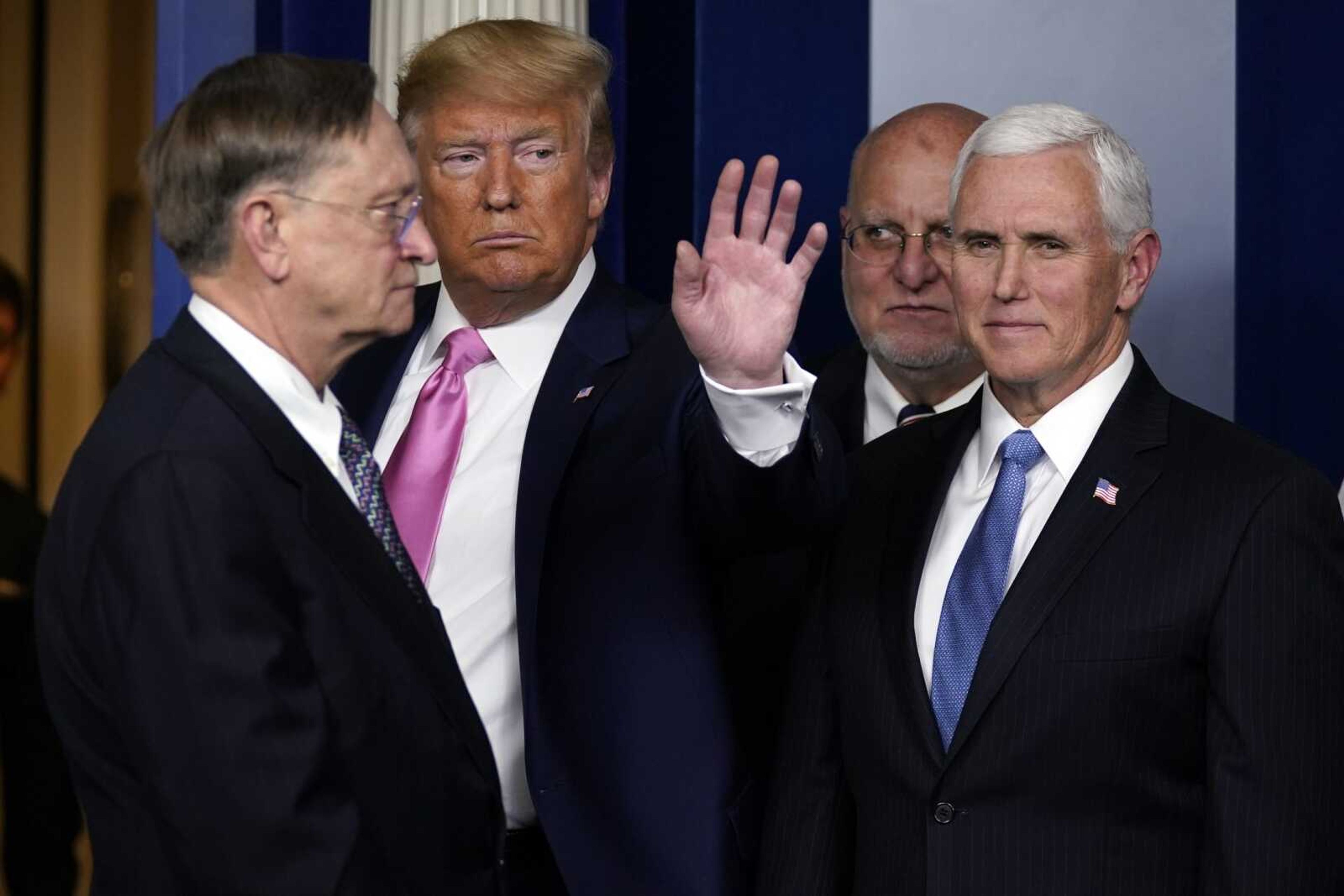Trump names Pence to lead U.S. response to coronavirus threat
WASHINGTON -- President Donald Trump declared Wednesday the U.S. is "very, very ready" for whatever the coronavirus threat brings, and he put his vice president in charge of overseeing the nation's response. Trump sought to minimize fears of the virus spreading widely across the U.S. ...
WASHINGTON -- President Donald Trump declared Wednesday the U.S. is "very, very ready" for whatever the coronavirus threat brings, and he put his vice president in charge of overseeing the nation's response.
Trump sought to minimize fears of the virus spreading widely across the U.S. But he said he was ready to spend "whatever's appropriate," even if that meant the extra billions of dollars that Democrats have said is necessary to beef up the U.S. response. Trump had told Congress earlier this week that the government needed to spend $2.5 billion to fight the virus.
"We're very, very ready for this, for anything," even if it's "a breakout of larger proportions," Trump told a news conference.
Vice President Mike Pence will be working with the government's top health authorities, and Trump's earlier-appointed coronavirus task force, to oversee the response.
Meanwhile, health officials said three new coronavirus cases have been reported in the U.S., bringing the tally here to 60.
Trump tweeted Wednesday the CDC, Health and Human Services Secretary Alex Azar and others in the administration are "doing a great job with respect to Coronavirus!" and accused some news outlets of "panicking markets."
On Capitol Hill, senior lawmakers called for a bipartisan spending package that would give federal, state and local officials more resources. Congress in recent years took a similar approach with the opioid epidemic, pumping out federal dollars for treatment and prevention. Senate Democratic Leader Chuck Schumer of New York unveiled an $8.5 billion coronavirus proposal.
Trump and members of his administration have been sending mixed messages about the virus.
The CDC on Tuesday warned the American public to prepare for an an outbreak of the disease, which has spawned more than 81,000 cases around the world -- mainly in China.
The count in the U.S. includes people who traveled back from outbreak areas in China or their spouses; three people who were evacuated from the central China city of Wuhan, and 42 Americans who were passengers on the Diamond Princess cruise ship and were evacuated by the federal government to the U.S. from where the ship was docked in Japan.
Before he flew home from India on Tuesday, Trump said the coronavirus situation is "very well under control in our country." The administration has asked Congress for an additional $2.5 billion to speed development of a vaccine, support preparedness and response activities, and to gather needed equipment and supplies.
Republican and Democratic lawmakers alike have questioned whether that request is sufficient.
Schumer's $8.5 billion plan is more than triple Trump's request. It includes $4.5 billion for the Department of Health and Human Services to work to contain the outbreak in the U.S., $1 billion to develop and manufacture a vaccine, $1 billion to help other countries battle the coronavirus, and $2 billion to reimburse states for costs incurred in tackling the outbreak.
House Appropriations chairwoman Nita Lowey, D-N.Y., said it's premature to put a price tag on the package. "We're working on it and we'll have a number but I'm not sure it's going to be the number that Schumer's proposing," said Lowey, adding that she's working with lawmakers of both parties.
Aides said the House measure is likely to be unveiled next week. Bipartisan "four corner" meetings -- Democrats and Republicans in both the House and Senate -- began Wednesday, a House Democratic aide said, with a bipartisan bill the goal.
Schumer has been harshly critical of Trump's response to the outbreak, and his request -- announced before the Democratic-controlled House Appropriations Committee has weighed in -- rankled some Democrats hoping for quick, bipartisan action to address the crisis.
Arriving back in the U.S. early Wednesday, Trump immediately began to counter critics who say he should have acted sooner to bolster the federal response to the coronavirus.
Trump has wondered aloud if health secretary Azar is the right person to lead the administration's response. The White House has considered naming a virus czar, but is not sure that is the right route, said a person familiar with the discussions. Azar himself was said to be supportive of naming a czar.
Among those under consideration for such a post: Former Food and Drug Administration Commissioner Scott Gottlieb. The person spoke on condition of anonymity to discuss private deliberations.
White House press secretary Stephanie Grisham was also pushing back. Grisham retweeted a CDC post that said "there is currently no reported community spread" of coronavirus in the U.S.
This week, the National Institutes of Health received a shipment of test doses of a vaccine candidate from Moderna Inc., in preparation for first-step safety testing in a few dozen people aimed to begin by April. But Dr. Anthony Fauci, NIH's infectious disease chief, cautioned reporters that in a best-case scenario, "you're talking about a year to a year and a half" before any vaccine would be ready for widespread use.
Fauci said that while only a few cases have turned up in the U.S. from travelers outside the country, "we need to be able to think about how we will respond to a pandemic outbreak."
"It's very clear. If we have a global pandemic, no country is going to be without impact," Fauci said.
A pandemic involves the continual spread of sustained transmission from person to person in multiple regions and hemispheres throughout the world simultaneously, Fauci noted.
Connect with the Southeast Missourian Newsroom:
For corrections to this story or other insights for the editor, click here. To submit a letter to the editor, click here. To learn about the Southeast Missourian’s AI Policy, click here.










